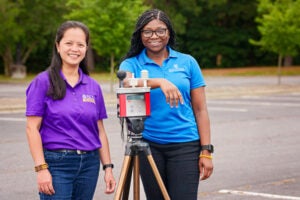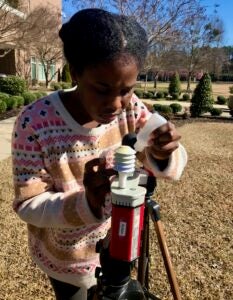Balanay furthering options for heat stress tools
Dr. Jo Anne Balanay, professor in the ECU Department of Health Education and Promotion, is working on funded projects focused on alternative risk assessment tools to potentially benefit workers facing heat stress exposure.
The first award, with the National Institute for Occupational Safety and Health as the originating sponsor, involves studying occupational heat exposure risk among outdoor workers by comparing a novel web-based app, developed by Balanay and Dr. Sinan Sousan, to a traditional heat stress monitor as the “gold standard” instrument. The second and more recent award is with Dualboot Partners and the American Industrial Hygiene Association to design and build a mobile app as a dynamic and free, accessible tool to assess occupational heat exposure risk among outdoor workers.

Dr. Jo Anne Balanay, left, stands with a heat stress monitor at the Belk Building during the summer of 2023. (Photo by Rhett Butler)
“Given the increasing temperature globally, heat stress exposure among outdoor workers is getting worse, resulting to an increased risk of heat-related illnesses and deaths,” Balanay said. “The use of heat stress monitors is the ideal method for assessing heat stress risk, but some industries may not have sufficient resources to purchase this expensive monitor or to hire trained personnel to operate such monitors. Thus, having an alternative risk assessment tool that is reliable, accessible and more affordable can help out small businesses and other industries in need, and will be tremendously beneficial in protecting workers from the adverse effects of heat stress.”
Balanay is the principal investigator for both awards and working with Master of Science in Environmental Health (MSEH) student Bridget Angol and Sousan, assistant professor in the ECU Department of Public Health, on these projects.
“The algorithm used in the original web-based app will be the basis for the algorithm to be used in the new mobile app, but will be improved based on the feedback from AIHA members,” Balanay said. “The beta version of the mobile app is expected to be released in June 2024.”
When asked about the future of their heat stress research, Sousan added, “We envision a future where workers can use low-cost sensors to monitor their psychological and environmental personal exposures in indoor and outdoor environments. These sensors will aid in developing a personal exposure and health risk assessment unique to each person. We will invest in artificial intelligence that will help predict health risks before potentially developing short- or long-term health effects that could be life-threatening.”

Bridget Angol, MS environmental health student, prepares a heat stress monitor for data collection during the summer of 2023. (Contributed photo)